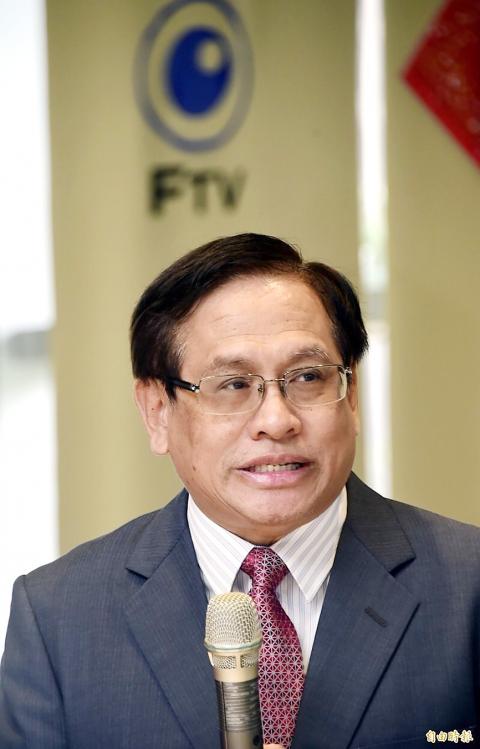The abrupt ouster of the chairman of the board at Minjian Investment Ltd Co (民間投資) on Thursday is widely seen as a tactic to take over control of Formosa TV (民視) in the upcoming vote for board chair at the network, sources within Formosa TV said.
Minjian Investment has a seat on the Formosa TV board of directors and owns a 49.7 percent stake in the network, meaning that whoever it supports in the election would likely become its chair.
Minjian’s board sacked Kuo Pei-hung (郭倍宏) as chairman after a vote of no confidence to a motion proposed by board member Huang Ming-chan (黃明展), but Kuo remains chairman at Formosa TV.

Photo: Pan Sha-tang, Taipei Times
Kuo received board approval to take out a NT$500 million (US$16.19 million) loan from Taishin International Bank using company shares as collateral, Huang said.
The board was not told what the loan would be used for and Kuo claimed that in its final decision, the board had approved getting a loan of an indeterminate amount from an unspecified bank, Huang said.
Kuo on Thursday also proposed to replace the accountant, the sources.
A motion by Huang to have the court appoint someone to audit Minjian Investment’s account is being considered, Huang said.
Kuo showed attendees at the board meeting the bank book to reassure them that the money was in the account, the sources said.
The account is in the company’s name, Huang said, but added that Kuo has access to both the seal and the bank book.
“What company would allow the chairman to have access to the seal and the bank book?” Huang said, adding that Kuo’s access allows him to move funds at will.
Kuo and Minjian Investment chief executive officer Wang Ming-yu (王明玉) could not be reached for comment on Friday.
The Formosa TV sources said that Wang supported Huang’s no-confidence motion because Kuo was rumored to want a professional manager to run the company and to replace Wang with his special assistant.

Taiwanese can file complaints with the Tourism Administration to report travel agencies if their activities caused termination of a person’s citizenship, Mainland Affairs Council Minister Chiu Chui-cheng (邱垂正) said yesterday, after a podcaster highlighted a case in which a person’s citizenship was canceled for receiving a single-use Chinese passport to enter Russia. The council is aware of incidents in which people who signed up through Chinese travel agencies for tours of Russia were told they could obtain Russian visas and fast-track border clearance, Chiu told reporters on the sidelines of an event in Taipei. However, the travel agencies actually applied

Japanese footwear brand Onitsuka Tiger today issued a public apology and said it has suspended an employee amid allegations that the staff member discriminated against a Vietnamese customer at its Taipei 101 store. Posting on the social media platform Threads yesterday, a user said that an employee at the store said that “those shoes are very expensive” when her friend, who is a migrant worker from Vietnam, asked for assistance. The employee then ignored her until she asked again, to which she replied: "We don't have a size 37." The post had amassed nearly 26,000 likes and 916 comments as of this

New measures aimed at making Taiwan more attractive to foreign professionals came into effect this month, the National Development Council said yesterday. Among the changes, international students at Taiwanese universities would be able to work in Taiwan without a work permit in the two years after they graduate, explainer materials provided by the council said. In addition, foreign nationals who graduated from one of the world’s top 200 universities within the past five years can also apply for a two-year open work permit. Previously, those graduates would have needed to apply for a work permit using point-based criteria or have a Taiwanese company

The Shilin District Prosecutors’ Office yesterday indicted two Taiwanese and issued a wanted notice for Pete Liu (劉作虎), founder of Shenzhen-based smartphone manufacturer OnePlus Technology Co (萬普拉斯科技), for allegedly contravening the Act Governing Relations Between the People of the Taiwan Area and the Mainland Area (臺灣地區與大陸地區人民關係條例) by poaching 70 engineers in Taiwan. Liu allegedly traveled to Taiwan at the end of 2014 and met with a Taiwanese man surnamed Lin (林) to discuss establishing a mobile software research and development (R&D) team in Taiwan, prosecutors said. Without approval from the government, Lin, following Liu’s instructions, recruited more than 70 software